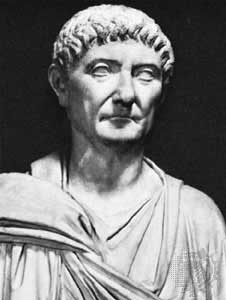Fall of the Empire
Top
After the Pax Romana ended about 200 years from when it began, Rome's conditions kept getting worse. The empire had completely disappeared by 476 AD and most of western Europe became a bunch of German kingdoms. The eastern empire lasted for about 1000 years longer because of the Byzantine Empire.
One reason the empire fell was political. Usually when an emperor died, either his son inherited the throne or the empire adopted an heir. The system of having the heir adopted only worked from 96 AD to 180 AD.
Marcus Aurelius became emperor in 161 AD and was nice, smart, and devoted. His son, Commodus was the exact opposite, though. So when Marcus died in 180 BC, he became emperor but was so cruel and hated that in 192 AD, he was strangled by the Praetorian, or emperor's, Guard. Then the Praetorian Guard sold the throne to the highest bidder. This set a really bad example and over the next 100 years, Rome had had 37 emperors and most had been killed by the guards or the army.
The next reason for the empire's fall was in its economy. An emperor had to make sure that his soldiers that were his supporters were happy, to stay in office. This meant that the emperor gave them high salaries which always grew and that led to higher taxes on the people.
Rome also began to suffer inflation as well. Because gold wasn't coming into Rome from conquests anymore, less and less gold was being used in coins. This made money lose its value and prices went up. Eventually people didn't use money at all and bartered with each other.
The last major reason Rome fell was because of foreign enemies. Since the Romans were fighting each other in politics, the Roman borders could be crossed. Germanic hunters and herders started attacking Gaul and Greece. So, again, cities were surrounding themselves with walls.
Diocletian and Constantine I
Top

Diocletian |
|---|
One of the most important changes was that Diocletian changed the emperor's position. He established a policy that said that the emperor's power and rule came from the gods and not the people.
Diocletian also figured that the empire covered too much area and divided it up into two parts and let another person rule the western part of the empire while Diocletian ruled the eastern part.

Constantine |
|---|
Wealthy landowners usually went to their villas to escape from the government's pressure and control over them. These villas were like small, independent kingdoms and each one had enough food for everyone who lived in it.
Even though the changes that Diocletian and Constantine made were good, they still didn't keep the western empire from falling. Because of this, Constantine moved the capital from Rome to a newly built city in Turkey called Constantinople.
The End of the Empire
Top
Even though the emperors worked hard to keep the empire alive, both failed in the end. First, the German attacks grew, mostly in western Europe. The Germans just crossed the Danube River to escape from the Huns who were people that had wandered west from Asia. In 378 AD, a group of Germans defeated the Roan legions at the Battle of Adrianople. One reason they won was because they borrowed and invention created by the Huns. This was a iron stirrup and it made the cavalry more powerful than the infantry, including Roman legions.
Rome had grown very weak by about 400 AD and in the winter of 406 AD, the Rhine River froze allowing groups of Germans to cross into Gaul. The Romans couldn't get the Germans back over the border after they had crossed.
In 410 AD, a Germanic chief named Alaric and his soldiers in invaded Rome burning records and taking money. Afterwards, the Roman senate told the people that Rome couldn't give them anymore finance or direction so they were on their own.